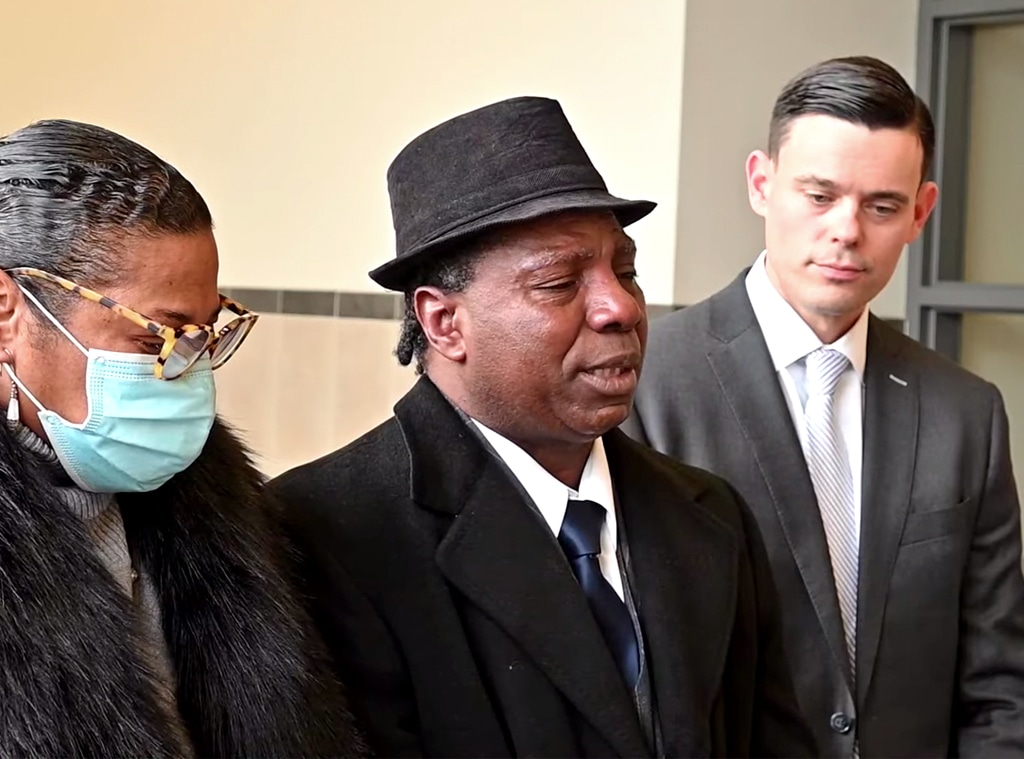 Katrina Tulloch/Syracuse.com/YouTube
Katrina Tulloch/Syracuse.com/YouTubeA judge has overturned the conviction of Anthony Broadwater, who served 16 years in prison after being wrongfully accused of the 1981 rape of The Lovely Bones author Alice Sebold.
New York State Supreme Court Justice Gordon Cuffy exonerated him on Monday, Nov. 22, at the courthouse in the city of Syracuse, and also vacated other counts related to the case. Sebold has not commented. Broadwater, who was released from prison in 1999, broke down sobbing after the ruling was made.
"I never, ever, ever thought I would see the day that I would be exonerated," the 61-year-old said after the court hearing, The Syracuse Post-Standard reported.
He also said, "I did everything I could do to always show people that I'm never that type of guy. I never could be that type of guy."
The judge agreed to overturn Broadwater's conviction after the prosecutor sided with two defense lawyers, who had asked for the dismissal based on flaws in the 1982 rape trial, the newspaper reported. District Attorney William Fitzpatrick said in the courtroom, "I won't sully these proceedings by saying I'm sorry. That doesn't cut it. This should never have happened."
"When the district attorney spoke to me, his words were so profound—so strong—it shook me," Broadwater told CNN on Wednesday, Nov. 24. "It made me cry with joy and happiness because a man of this magnitude would say what he said on my behalf...it's, it's beyond whatever I can say myself."
Sebold, whose 2002 book The Lovely Bones inspired a 2009 movie of the same name, had written in her 1999 memoir Lucky about her sexual assault. She wrote that a stranger beat and raped her a tunnel in Thornden Park near Syracuse University, when she was a freshman there. Months later, she saw on a street in the city a man who reminded her of her rapist, and she reported the encounter to police.
She later wrote about how she failed to identify the authorities' suspect for her rape in a police lineup. But prosecutors later used her account and a microscopic hair analysis—which, 35 years later, was deemed faulty—as evidence and Broadwater, then 20, was charged with forcible rape. Sebold testified at his trial.
"I just hope and pray that maybe Ms. Sebold will come forward and say, 'Hey, I made a grave mistake,' and give me an apology," he told The New York Times. "I sympathize with her. But she was wrong."
Broadwater consistently maintained he was innocent. Before completing his prison sentence, he was denied parole at least five times because he wouldn't admit to a crime he didn't commit, according to his attorneys, and also passed two lie detector tests, CNN reported.
In 2019, it was reported that Lucky would be adapted into a movie. Earlier this year, executive producer Timothy Mucciante noticed discrepancies between the memoir and the script. He told The New York Times, "I started having some doubts, not about the story that Alice told about her assault, which was tragic, but the second part of her book about the trial, which didn't hang together."
Mucciante, who has since left the production, hired a private investigator to examine the evidence against Broadwater and helped bring it to a lawyer, who Broadwater ended up hiring for his defense team and who helped lead to his conviction being overturned.
On Thursday, Nov. 25, days after Broadwater was exonerated, Variety reported that the Lucky film was dropped after losing its financing months ago.
On New Year's Day 1999, eight months before Sebold's memoir was published, Broadwater, then 38, was released from prison after about 16 years behind bars. Now with his conviction overturned, Broadwater will be removed from the sex offender registry, to which he was added following his sentence. His status on the list and his criminal record made it hard for him to make a living.
"A lot of doors have been slammed in my face for jobs," he told reporters outside the court.
Broadwater told CNN, "I did what I could do and that was just you know—creating work for myself doing landscaping, tree removal, hauling, clean-outs."
In 1999, after his release from prison, Broadwater started seeing his now-wife, Elizabeth.
"She wanted children. I wouldn't bring children in the world because of this," Broadwater told reporters in court. "And now, we're past the age. We can't have children."
He told The Syracuse Post-Standard that Elizabeth believed in him, adding, "I told her I'd never stop fighting this case."